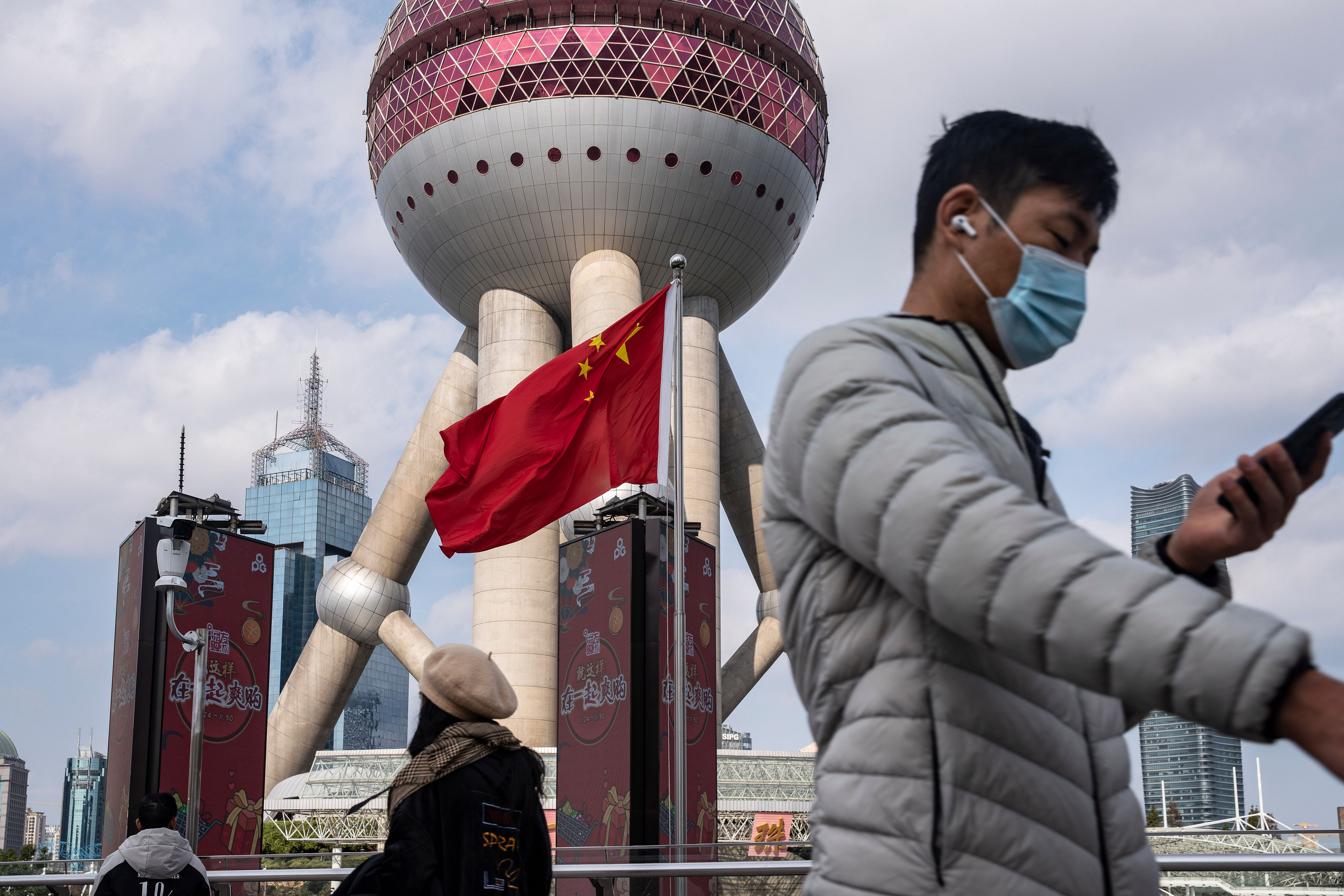China Sees Historic Turn: Negative Foreign Direct Investment as Geopolitical Tensions Rise

China Sees Historic Turn: Negative Foreign Direct Investment as Geopolitical Tensions Rise
In a striking departure from its usual economic trends, China has recently recorded its first-ever quarterly deficit in foreign direct investment (FDI), marking a significant shift in the country’s economic landscape. Balance of payments data has revealed that direct investment liabilities, a key measure of FDI, amounted to a deficit of $11.8 billion during the July-September period. This unprecedented dip into negative territory in terms of FDI is being linked to a phenomenon known as “de-risking,” primarily driven by Western countries, as they navigate the complex web of geopolitical tensions surrounding China.
The world has watched with bated breath as China has steadily risen to become one of the globe’s most influential economic superpowers. Over the past few decades, the country’s remarkable economic growth has been characterized by a steady inflow of foreign capital, further solidifying its status as a hub for foreign investment. This trend, however, seems to have experienced a significant disruption as China’s balance of payments data reports a deficit in FDI for the first time. This development warrants close scrutiny, as it bears witness to the broader implications of the evolving geopolitical landscape and China’s place in it.

A Historic Shift in FDI Trends
Foreign Direct Investment, commonly referred to as FDI, is the lifeblood of a country’s economic development, often signifying trust in a nation’s economic prospects. For China, it has been the catalyst behind its meteoric rise, driving the nation’s robust industrialization and modernization efforts. However, as the world faces an intricate geopolitical dance characterized by strained relationships between China and the West, the landscape of FDI is undergoing a transformation.
The recent data, indicating a deficit in FDI, is a telling sign of this shift. While the deficit itself is notable, it is vital to understand that this negative balance represents the gap between the amount of FDI that has entered the country and the FDI that has exited during a specific period. A deficit, in this context, implies that more capital has flowed out of China than into it, marking a stark reversal from the country’s usual FDI surplus.
De-Risking: The Geopolitical Catalyst
To fully grasp the implications of this historic shift, it is essential to delve into the concept of “de-risking.” This term encapsulates the strategies employed by Western countries, primarily the United States and its allies, to reduce their economic exposure to China amid escalating geopolitical tensions.
Geopolitical tensions between China and the Western world have grown steadily over the years. Issues such as trade disputes, concerns over intellectual property theft, human rights violations, and territorial disputes in the South China Sea have fueled these tensions. This has prompted Western nations to reassess their economic ties with China.
In response to these concerns, Western governments and companies have adopted a cautious approach towards China. Many have begun to reevaluate their investments, shifting their focus towards less risky destinations. This trend, known as de-risking, has seen a significant retraction in foreign investments in China. Companies are now prioritizing diversification and risk mitigation over the promise of China’s vast market potential.
De-Risking in Action
The manifestation of de-risking can be observed through various channels. One of the most significant is the withdrawal of foreign capital from China, as foreign companies divest their interests in the country. These divestments can take various forms, from selling off stakes in Chinese businesses to relocating supply chains away from the country.
The technology sector is a prime example of this trend. Amid growing concerns over data security and intellectual property protection, Western technology companies have been particularly vigilant. Several have reduced their investments in China and have sought alternative markets and manufacturing hubs. Additionally, the Chinese government’s regulatory crackdown on tech giants has further contributed to the uncertainty surrounding the sector.
Furthermore, the financial sector has experienced a reduction in foreign investments. Chinese restrictions on foreign ownership of financial firms have made Western investors wary, with some choosing to withdraw their stakes. This development is noteworthy as China has been actively opening up its financial markets to foreign investment in recent years.
While de-risking is apparent in specific sectors, it also extends to the broader spectrum of foreign investments. Multinational corporations across industries are reevaluating their strategies in response to the geopolitical environment. They are diversifying their portfolios by seeking investments in other, less contentious markets.

The Broader Implications of Negative FDI
China’s shift from a surplus to a deficit in FDI carries substantial implications for its economy and global economic dynamics. Firstly, this trend indicates a loss of investor confidence in China. Historically, investors have been drawn to China’s large consumer base, robust manufacturing capabilities, and potential for high returns. The negative FDI suggests that these factors are being overshadowed by the risks associated with the geopolitical tensions.
In the long run, a decline in FDI may impact China’s economic growth and development. A reduced influx of foreign capital can limit the country’s ability to finance new projects, modernize industries, and create jobs. Additionally, it can lead to a slowdown in technological transfer and innovation, as many foreign investments have historically contributed to China’s technology advancements.
On a global scale, the shift in FDI may lead to changes in the distribution of investments. Countries that are perceived as less risky may see an uptick in foreign investments, potentially redistributing economic influence and power. For instance, Southeast Asian countries like Vietnam and India have been attracting attention as alternative investment destinations due to their relatively stable political environments and growing consumer markets.
China’s Response: Navigating the New Normal
China has not been passive in response to this shifting FDI landscape. The government is taking steps to adapt to the new normal, recognizing the need to mitigate the effects of de-risking. One approach has been to encourage domestic consumption to offset the decline in foreign investment. The “dual circulation” strategy, which emphasizes both domestic and international markets, is a central component of this effort. By stimulating domestic demand, China hopes to reduce its reliance on foreign investments for economic growth.
The Chinese government is also implementing policies to enhance the business environment for foreign investors. This includes measures to improve intellectual property protection, reduce bureaucratic hurdles, and foster innovation. By demonstrating a commitment to addressing the concerns that have driven de-risking, China aims to rebuild investor confidence.
Moreover, China has actively sought to strengthen economic ties with other nations through initiatives like the Belt and Road Initiative (BRI). This vast infrastructure project aims to improve connectivity between China and other countries, thereby opening new avenues for investment and trade.
The Road Ahead: Uncertainties and Opportunities
As China grapples with its first-ever negative FDI, there are both uncertainties and opportunities on the horizon. The trajectory of the global economy is likely to be influenced by how China adapts to the changing investment landscape and how Western countries navigate their relationships with the Asian giant.
Uncertainties persist in the geopolitical arena, and these uncertainties are likely to shape the attitudes of investors and governments alike. How trade disputes, intellectual property issues, and human rights concerns evolve will significantly impact investor sentiment towards China.
Opportunities, however, are not entirely elusive. China remains an attractive market due to its sheer size and growing middle class, and the country’s economic prospects are closely linked with the global economy. Many businesses still view China as a vital part of their long-term strategies, even if they are currently adopting a more cautious approach.
Furthermore, the negative FDI trend underscores the need for constructive dialogue and collaboration among nations. In an interconnected world, economic prosperity is often intertwined with international cooperation. As countries reassess their relationships and economic ties, there is an opportunity for diplomatic efforts to de-escalate tensions and pave the way for more stable and mutually beneficial trade and investment relationships.
In conclusion, China’s recent shift from a surplus to a deficit in foreign direct investment is a compelling reflection of the complex interplay between geopolitics and economics. The concept of “de-risking” by Western countries, driven by escalating tensions with China, has reshaped the global investment landscape. As China responds to this new reality, uncertainties and opportunities abound, and the outcomes will undoubtedly have far-reaching consequences for the global economy. The world watches with interest as the geopolitical dynamics continue to evolve, shaping the future of foreign direct investment and the economic landscape of the world’s most populous nation.





